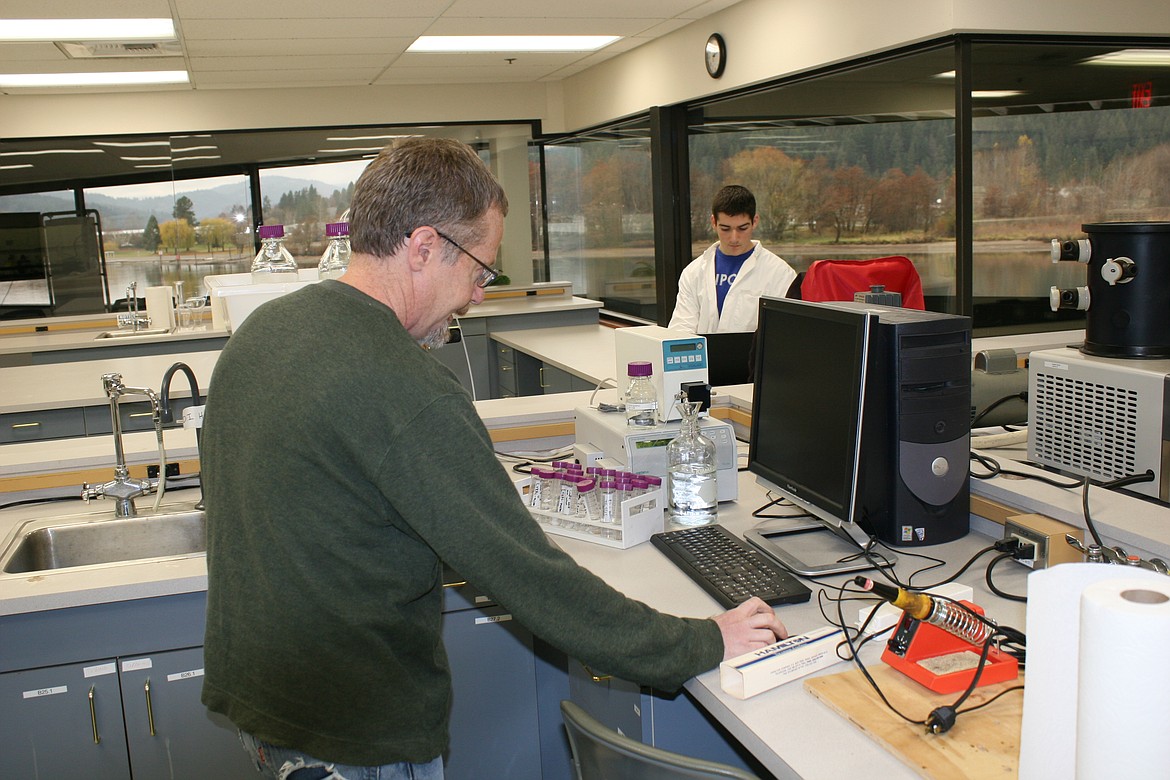Researcher gives students hands-on experience at lab
In Idaho’s panhandle region public schools are actively committed to providing students with quality STEM-education learning opportunities. In Bonner County, for example, these courses range from an expansive summer robotics program at Southside Elementary, to the notable and innovative experiential learning track program at Clark Fork High School. Area public schools at every level are engaging students in the exploration of career fields in science, technology, engineering, and math — hence, STEM.
And so is one private individual, a chemist by the name of Dr. Darren Thompson, a researcher in the field of organic chemistry. Although a resident of Sagle, Thompson’s “office” is a laboratory at the University of Idaho’s Coeur d’Alene Harbor Center. Here he undertakes peptide-based biomedical research. But not alone. For the past few years, Thompson has been bringing in both college- and high school-level students to participate in his work. These students conduct genuine scientific research, using beakers, test tubes, burets, spectrometers — the whole shebang.
Thompson’s current student assistant is Jonathan Webb, a sixteen-year-old senior at Coeur d’Alene High School, although he takes all of his coursework as a dual-credit student at North Idaho College. Webb learned about Thompson through an inquiry to Gonzaga University in Spokane. He had sent out about 30 emails looking for a hands-on learning opportunity in a laboratory in the local area and this trail led him to the UI-Coeur d’Alene science laboratory.
Currently, Webb is conducting peptide synthesis as part of a larger work being developed by Thompson. This experience working in the lab has been compelling for Webb, whose preliminary plan to become a medical physician is now leading him toward becoming a chemist. Webb prefers working in the lab, rather than simply learning from a book. For him, it is “real world” learning.
One former student was more than simply a lab assistant, he was a co-researcher. Tyler Siegford, currently an undergraduate student at the University of Idaho in Moscow, spent two summers with Thompson and gained valuable skills and insights into conducting research. So successful was Tyler’s work with Thompson, that he completed two research projects and presented the results at multiple conferences, including the Idaho Conference on Undergraduate Research and the Idaho Idea Network for Biomedical Research Excellence conference. Subsequently, he received three fellowships: a Summer Undergraduate Research Fellowship, and two INBRE fellowships. He was also able to attend a conference with Thompson at the University of Chicago where he met some of the world’s foremost experts in protein chemistry.
Thompson and Siegford are also currently working to publish the results of their most recent collaboration, which Siegford will be presenting at the American Chemical Society Conference in Orlando, Fla., this spring.
While Thompson’s presence at the UI-Coeur d’Alene lab is somewhat accidental, his work with students is not. Thompson’s previous post was as a researcher at the Scripps Research Institute in La Jolla, Calif., — one of the leading, if not the leading, research institutes in the world. Thompson left Scripps in 2015 due to health reasons. For a while, Thompson thought that his work as a researcher had ended; but he was wrong. New opportunities would soon present themselves at his new home in North Idaho. Through a series of fortuitous encounters, Thompson was provided with work space at Gonzaga University in Spokane to continue his work in biomedical protein research. While Thompson appreciated this opportunity, it was less than desirable. There he would not able to intern students, a work he was passionate about. By actively pursuing further contacts, Thompson found himself in his current laboratory “home” at the Harbor Center of UI-Coeur d’Alene. Specifically, the lab under the guidance of John Wieser, the lab coordinator at UI-Coeur d’Alene. Here he not only found a great facility for conducting research, but also an environment that welcomed his vision of outreach to train and support promising college- and high school-level students. In fact, to facilitate his desire to mentor students, the University of Idaho made Thompson an adjunct professor.
Why is mentoring students so important to Darren Thompson? The answer to that question is a bit complex. First, Thompson feels that he has been given a lot, and so he is, in a fashion, repaying those who had invested in him. Second, he feels that young people need good role models, especially in science. He says that, “Individuals rise or fall in accordance with expectations and challenges placed before them — I do not champion mediocrity.” Thompson would also quote John Kennedy who stated that, “We go to the moon, not because it is easy, but because it is hard.” Thompson believes that if young people are given challenging opportunities, they will rise to the occasion.
And Thompson is not in this work for the money. He earns nothing from his lab work and mentoring, and supports his efforts both out-of-pocket and with the in-kind assistance of Wieser.
STEM education is important. Some would say that it is essential. Thompson surely feels that way, which is why he does what he does. And we are all the better for it.

